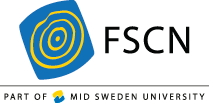Modulit
More efficient ways to build batteries and other devices to save energy is the goal of the new research project MODULIT. Inexpensive and efficient energy storage is a prerequisite for the development of power-driven vehicles and for an efficient use of renewable electrical energy like wind power and solar energy.
Cooperation in research
"It is very stimulating for a small university like ours to be a part of the Swedish cutting edge research in this area", says Sven Forsberg, sub project manager at Mid Sweden University. "The reason is that we, for some years now, have chosen to intensify our research in the areas of nanotechnology and material physics. In the KEPS project, supercapacitors, a kind of energy storage devices, are built. Among other things, they can be used in cars to save energy and fuel. This group of researchers has also shown that grapheme coated on paper can offer an inexpensive and efficient energy storage opportunity with a high content effect."
Energy-efficient and reasonably priced storage devices
"Stored energy is expensive today and we will develop ways to build devices for energy storage that are a lot more cost-efficient", says Sven Forsberg. "Hopefully, our study will lead to new, energy-efficient and good value storage devices with a good environmental performance. The development can be compared to computers that have gone from being a big, complicated intertwining database with a large number of components to a small, integrated circuit that can do more. It also is smaller and easier to adapt to customers. Our aim with this project MODULIT is to make the development of batteries go in the same direction."
The idea of MODULIT is that the storage of energy and the control electronics, that is always needed, are built at the same time and therefore can be integrated in the same device. The project time is four years and the goal is to demonstrate that the technology works.
The project is financed by the Swedish Energy Agency with a total of 16 million SEK, out of which 2 million SEK goes to Mid Sweden University. The project is lead by the research institute Acreo Swedish ICT. Other participants are KTH Royal Institute of Technology, Linköping University, Innventia and SICS East Swedish ICT.
More information about the project please visit Acreo.se.







